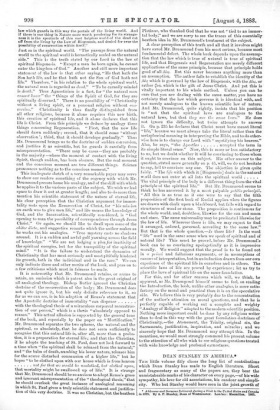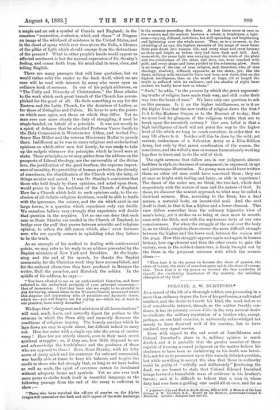DEAN STANLEY IN AMERICA.* Tun little volume fitly closes the
long list of contributions which Dean Stanley has made to English literature. Short and fragmentary as many of the papers are, they bear the unmistakeable marks of his character on every page,—of his wide sympathy, his love for old associations, his candour and simpli- city. Who but Stanley would have seen in the joint growth of
• Addresses and Sermons Delivered during a Visit to the 17s.ited States and Canada in 1878. By A. P. Stanley, Dean of Westminster. Londoa: Maansillan. 1885.
a maple and an oak a symbol of Canada and England ; in the ceaseless "contortion, c•ufusion, whirl, and chaos" of Niagara an image of the whirlpool of existence in the United States, and in the cloud of spray which ever rises above the Falls, a likeness of the pillar of light which should emerge from the distractions of the present P What in other people's hands would appear as affected sentiment is but the natural expression of Dr. Stanley's feeling, and comes forth from his mind clad in terse, clear, and telling English.
There are many passages that will bear quotation, but we would rather refer the reader to the book itself, which we are sure will be read with interest by many who never open an ordinary book of sermons. In one of his pulpit addresses, on "The Unity and Diversity of Christendom," the Dean alludes to the work which each great branch of the Church has accom- plished for the good of all. He finds something to say for the Eastern and the Latin Church, for the doctrines of Luther, as for those of Zwinglius and Calvin. He loves to note the points on which men agree, not those on which they differ. Yet no man ever saw more clearly the duty of struggling, if need be single-handed, on behalf of a principle. It was not merely in
a spirit of defiance that he admitted Professor Vance Smith to the Holy Communion in Westminster Abbey, and invited Pro- fessor Max Mfiller and the veteran Missionary Moffat to preach
there. Indifferent as be was to many religions and ecclesiastical opinions on which other men feel keenly, he was ready to take up the cudgels whenever the principles which he loved were at stake. These principles, as we may gather from the address on the prospects of Liberal theology, are the universality of the divine love, the justification of the good heathen, the supreme import- ance of morality, the possibility of human perfection, the divinity of conscience, the identification of the Church with the laity, of
things secular and sacred. It was Dr. Stanley's conviction that those who held firmly by these opinions, and acted upon them, would prove to be the backbone of the Church of England.
How far a Church which held to such opinions only, to the ex- clusion of all definite religious doctrines, would be able to battle with the ignorance, the misery, and the sin which exist in our large towns, is a question which experience only can decide.
We ourselves believe very strongly that experience will decide that question in the negative. Yet no one can deny that such men as Dean Stanley are needed in the Church of England, to bridge over the gulf that yawns between scientific and religious opinion, to soften the differences which, alas ! exist between men who are equally earnest in upholding what they believe
to be the truth.
As an example of his method in dealing with controversial points, we may refer to his reply to an address presented by the Baptist ministers of New York and Brooklyn. At the begin- ning and the end of his speech, be thanks the Baptist community for the Christian work they have accomplished, and for the eminent characters they have produced in Bunyan the writer, Hall the preacher, and Havelock the soldier. In the middle of his address, he says :—
" You have alluded to me as en ecclesiastical historian, and have referred to the undoubted antiquity of your principal ceremony,— that of immersion. I feel that bete also we ought to be grateful to you for having, almost alone in the Western Church, preserved intact this singular and interesting relic of primitive and Apostolic times, which we—you will forgive me for saying so—which we, at least in our practice, have wisely discarded."
We hope that "clergymen and ministers of all denominations" will read, mark, learn, and inwardly digest the preface to the sermons in which the Dean ably and earnestly discusses the conditions of religious inquiry. The homely maxims which he lays down are easy to speak about, but difficult indeed to carry
out. How few enter with a single eye into the arena of contro- versy ! How few are utterly sincere, even in their most secret spiritual struggles ; or, if they are, how little disposed to see and acknowledge the truthfulness and the goodness of those who are opposed to them ! Even Dean Stanley, with his lofty scorn of party spirit and his contempt for outward ceremonial, was hardly able at times to keep his balance, and to give due credit to those who feel strongly that, so long as we have bodies as well as souls, the spirit of reverence cannot be inculcated without adequate forms and symbols. Yet no one ever took more pains to clothe truth itself in beautiful language, as the following passage from the end of the essay is sufficient to show :— " Those who have watched the effects of sunrise on the Alpine ranges will remember the dark and chill aspect of the wide landscape in the moment preceding the dawn. At last there arose at once in the western and the eastern heavens a colour, a brightness, a light- ness—varying, diffused, indefinite, but still spreading and brightening and lightening over the whole scene. Thou, as in a moment, in the twinkling of an eye, the highest summits of the range of snow burst from pale death into roseate life, and every slope and crest became as clear and bright as before they had been dark and dull. And, meanwhile, the same light was creeping round the mists of the plain and the exhalations of the lakes, and they, too, were touched with gold, and every shape and form yielded to the returning glow. Such is an image of the rise of true religion, and, therefore, also of true theology, shadowy, diffused, expansive as the dawn, yet, like the dawn, striking with irresistible force now here, now there, first on the highest intelligence, then on the world at large, till at length the world is suffused with its radiance, and the shades of night have melted, we hardly know how or where."
" Such," he adds, " is the process by which the great regenerat- ing truths of religion have made their way, and still rtake their way into the heart of man." We have only one question to ask on this passage. Is it on the higher intelligences, or is it on the higher lives that the new truths of religion dawn the first P
Is it to the Madame Guyon or to the Bossuet of to-day, that we must look for glimpses of the religious truths that are to break upon the twentieth century ? Our own belief is that a high intelligence of itself will not point the way to the higher level of life which we long to reach ourselves, in order that we may lift others to it. Neither will this be done by the wild, yet earnest, enthusiasm of a Salvation Army or a Blue-Ribbon Army, but only by that rarest combination of the reason, the conscience, and the will of a man or woman harmoniously working together to know and to do the will of God.
The eight sermons that follow are, in our judgment, almost faultless in style, in clearness of arrangement, in argument, in apt and picturesque illustration. No young man could have written them, no other old man could have conceived them ; they are at once so bright with feeling and fancy, so rich in experience!
The finest of the series are, we think, the two last, which deal respectively with the nature of man and the nature of God. In these, we discover the nearest approach to what may be called a doctrinal sermon. Man, according to the Dean, has a dual nature, a material body, an immaterial soul. And the soul itself is dual, in that it has a higher and a lower element. This view differs somewhat from the ordinary tripartite view of man's being, yet it strikes us as being at once more in accord- ance with the Bible, and with the mysterious facts of our own consciousness. For when the struggle of the soul over the body is, as we think, complete, there ensues the more difficult struggle
between the higher and the lower soul, between the Irssi4cts and the 44%4. How this struggle appears again and again in human
history, how imp element and then the other seems to gain the victory, even in the noblest characters, is finely brought out by the Dean in the pregnant sentence with which the sermon closes :—
" Thou heat it in thy power to become the slave of passion, the slave of luxury, the slave of senseless party spirit, the slave of corrup- tion. Thou bast it in thy power to become the free controller of thyself, the everlasting benefactor of thy country, the unfailing champion of thy God."



































 Previous page
Previous page